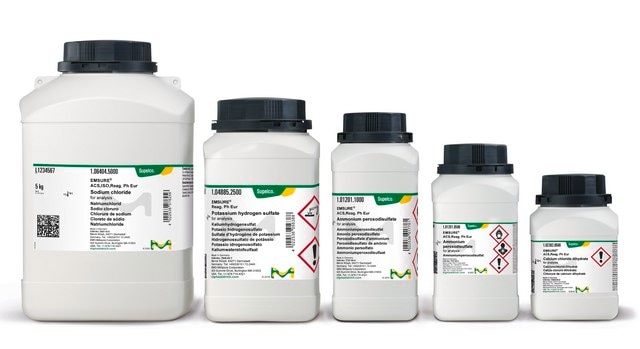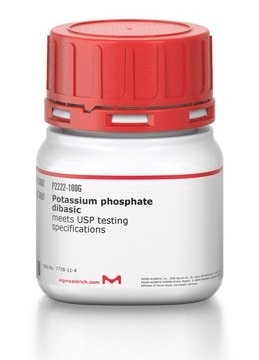1.05109
Potassium phosphate dibasic
anhydrous 99.99 Suprapur®
Synonym(s):
Potassium phosphate dibasic, Dipotassium hydrogen phosphate, Potassium phosphate dibasic, Dipotassium Phosphate, di-Potassium hydrogen phosphate, Dipotassium hydrogenphosphate, Dipotassium phosphate, sec.-Potassium phosphate
About This Item
Recommended Products
grade
for inorganic trace analysis
Quality Level
assay
99.99%
form
solid
potency
8000 mg/kg LD50, oral (Rat)
pH
9 (20 °C, 10 g/L in H2O)
solubility
1600 g/L
density
2.44 g/cm3 at 20 °C
bulk density
700‑1000 kg/m3
storage temp.
2-30°C
SMILES string
[K+].[K+].OP([O-])([O-])=O
InChI
1S/2K.H3O4P/c;;1-5(2,3)4/h;;(H3,1,2,3,4)/q2*+1;/p-2
InChI key
ZPWVASYFFYYZEW-UHFFFAOYSA-L
Looking for similar products? Visit Product Comparison Guide
Related Categories
Application
- beta-lactoglobulin stabilized nanemulsions--Formulation and process factors affecting droplet size and nanoemulsion stability.: This study investigates the impact of formulation and process parameters on the stability and size of beta-lactoglobulin stabilized nanemulsions, potentially involving potassium phosphate dibasic in the formulation process (Ali et al., 2016).
- Correlation of characteristics of gel extrusion module (GEM) tablet formulation and drug dissolution rate.: Examines how the characteristics of gel extrusion in tablet formulations influence drug dissolution rates, relevant for chemists looking into dissolution behavior and possibly involving potassium phosphate dibasic (Juang and Storey, 2003).
- High-performance liquid chromatographic determination of phenylureas by photochemically-induced fluorescence detection.: Discusses a method for detecting phenylureas using high-performance liquid chromatography, which could involve potassium phosphate dibasic as a component of the mobile phase or sample preparation (Munoz de la Pena et al., 2002).
- Assay and purity analysis of diatrizoate sodium in drug product by LC.: This research details a method for assaying and analyzing the purity of diatrizoate sodium, where potassium phosphate dibasic could be part of the chromatographic system (Chellquist et al., 1997).
Analysis Note
Assay (acidimetric): ≥ 99.5 %
Specific absorbance (at 260 nm; 10 %; 2 cm; water): ≤ 0.010
Chloride (Cl): ≤ 5 ppm
Sulfate (SO₄): ≤ 30 ppm
As (Arsenic): ≤ 0.1 ppm
Ba (Barium): ≤ 5.00 ppm
Ca (Calcium): ≤ 0.50 ppm
Cd (Cadmium): ≤ 0.005 ppm
Ce (Cerium): ≤ 0.010 ppm
Co (Cobalt): ≤ 0.010 ppm
Cu (Copper): ≤ 0.005 ppm
Eu (Europium): ≤ 0.010 ppm
Fe (Iron): ≤ 0.100 ppm
Hg (Mercury): ≤ 0.05 ppm
La (Lanthanum): ≤ 0.010 ppm
Mg (Magnesium): ≤ 0.50 ppm
Mn (Manganese): ≤ 0.010 ppm
Na (Sodium): ≤ 50 ppm
Ni (Nickel): ≤ 0.010 ppm
Pb (Lead): ≤ 0.005 ppm
Sm (Samarium): ≤ 0.010 ppm
Sr (Strontium): ≤ 0.50 ppm
Tl (Thallium): ≤ 0.01 ppm
Y (Yttrium): ≤ 0.010 ppm
Yb (Ytterbium): ≤ 0.010 ppm
Zn (Zinc): ≤ 0.010 ppm
Legal Information
Storage Class
13 - Non Combustible Solids
wgk_germany
WGK 1
flash_point_f
Not applicable
flash_point_c
Not applicable
Certificates of Analysis (COA)
Search for Certificates of Analysis (COA) by entering the products Lot/Batch Number. Lot and Batch Numbers can be found on a product’s label following the words ‘Lot’ or ‘Batch’.
Already Own This Product?
Find documentation for the products that you have recently purchased in the Document Library.
Customers Also Viewed
Our team of scientists has experience in all areas of research including Life Science, Material Science, Chemical Synthesis, Chromatography, Analytical and many others.
Contact Technical Service





